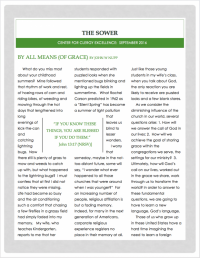By All Means (Of Grace)
By Rev. John W. Nupp
“If you know these things, you are blessed if you do them.”
John 13:17 (NRSV)
 What do you miss most about your childhood summers? Mine followed that rhythm of work and rest, of hoeing rows of corn and riding bikes, of weeding and mowing through the hot days that lengthened into long evenings of kick-the-can and catching lightning bugs.
What do you miss most about your childhood summers? Mine followed that rhythm of work and rest, of hoeing rows of corn and riding bikes, of weeding and mowing through the hot days that lengthened into long evenings of kick-the-can and catching lightning bugs.
Now there still is plenty of grass to mow and weeds to catch up with, but what happened to the lightning bugs?
I must confess that at
I worry that someday, maybe in the not-too-distant future, some will say, “I wonder
As we consider the diminishing influence of the church in our world, several questions arise:
- How will we answer the call of God in our lives;
- How will we achieve the goal of sharing grace within the congregations we serve, the settings for our ministry?
- Ultimately, how will God’s call on our lives, worked out in the grace we share, work through us to transform the world?
In order to answer
Those of us who grow up in these United States have a hard time imagining the need to learn a foreign
The short answer is, no, they don’t!
Dallas Willard uses the process of learning a new language as a metaphor for learning how to grow and change into more active followers of Jesus. In order to become adept at a new language, you need to have a Vision. But having a vision alone will not enable you to acquire that language; you must attend to your will, your intention, your desire to apply yourself to learning. Beyond this Vision and Intention, you must develop the Means to language acquisition.
Those of us steeped in the Wesleyan tradition are familiar with the language of means, specifically the means of grace. These are the channels by which God’s grace, God’s active love, flows into our lives. By these
When we lose our way, when we stumble along in the dark, when we lose our joy, these are the lesser lights that lead us to the True Light, restoring us to the joy of our salvation.
We may have a vision of God’s love abundantly at work in the world, but what makes this Vision more than just a distant memory, more than just a dream?
We may address our work as servants of Christ with the intention of seeing God’s grace, God’s radical acceptance, lived out in our homes and in the church. But how we move from vision and intention into lives of discipleship comes by way of employing those means of grace God has given us.
Sounds like common sense, doesn’t it? Seems like a no-brainer? But how many times have we become so busy in our lives, so comfortable in our sanctuaries, that we have lost sight of the life we have been missing?
I submit to you, brothers and sisters in Christ, and fellow servants of the Servant, that we are losing sight of the Means of Grace.
By our own efforts to maintain well-manicured houses of worship, we have managed to eclipse the source of light in our midst. By seeking to provide for our own security, we have drowned out the lesser lights that lead us to the source of joy, to salvation from our own self-righteousness. We have become so ingrown and self-centered in
And so, we must embark on a campaign of Spiritual Literacy. If we ourselves knew the language of God already, don’t you think we could have taught the world how to love by now. But dear children of God, there is so much we need to unlearn
We are called to be unique, but not individualistic, bringing truth to power in the shape of a cross.
By what means, you may ask? By all means necessary, by all the means of grace, that
An interview with Spiritual Literacy co-creator Rabbi Joshua Martin Siegel
Rabbi Joshua Martin Siegel served the Columbia Jewish Congregation from its inception until 1997, also serving as White House Advisor for Housing and Homelessness. He began serving as Rabbi to the Baltimore Washington Conference in 2005. He continues to teach several studies each week, including a Torah study on Thursdays at the Mission Center.
We invite you to join us in the Spiritual Literacy process, which we have been developing together.
I wanted to share some of his thoughts on Spiritual Literacy:
“We need to transform the meaning of words like God, grace, etc. Our vocabulary has been atrophied. It has lost most of its meaning for those in the world and even for those of us within religious institutions.”
“My goal is to allow students, some of whom are pastors, to develop a framework for looking for God in
“We need to get away from preaching, from the approach that says, “I know, now let me tell you!” That model has failed. With honesty and humility, we can move from what we know of God, to discover the wisdom of what we do not yet know and to embrace the mystery of what we cannot know. Together as human beings, we can begin to bring true renewal to our troubled institutions and to our world.”
